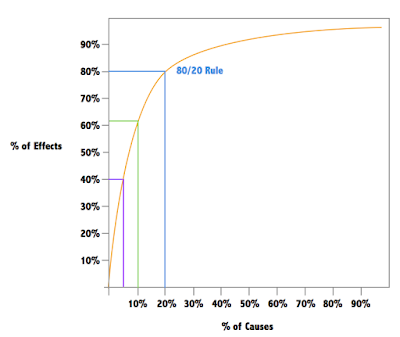Success means different things to different people. For this discussion, we will define it as is how well you are able to achieve whatever you set your life toward.
I, too, hope for success. It is my dream to one day walk into the Sci-fi and Fantasy aisle of a Barnes & Noble and see a book with my name on it. But when I think about the millions of people who write books, or at least want to write books, those shelves in the bookstore start to look very small.
This is an example of the Pareto principle, or the 80/20 rule. The Pareto principle is the observation that, for any measure of success, 80% of it is held by 20% of the people who seek it. This also applies for sub-sections of the distribution, meaning 64% of the success is held by 4% of the people (80% of the 80% is held by 20% of the 20%), and so on. Of course, this is only a general observation across large numbers of people in many different areas of life. Within small groups of people, the numbers may be different. But overall, it shows us that success is rare.
Like any statistical rule, the Pareto principle is not baked into reality, but shaped by a number of different factors. Part of it is because work also follows the Pareto principle; on average, 20% of workers do 80% of the work. But this is not the whole story, and it, too, needs to be explained. So let’s look at some of the reasons these 80/20 rules exist.
We are not born blank slates. Each of us has different personalities, interests, and talents, which affect what we can be good at, and how good we are at them. No amount of hard work is going to turn the average truck driver into a groundbreaking theoretical physicist, or the average biologist into a world-class basketball player. So part of the success equation comes from natural-born talents and interests.
Another thing to consider, and an unfortunate fact of our society, is that the playing field is not level. Many people are born too poor to practice and make use of their talents. Others are born into social minorities, groups of people for whom, by tragic accidents of history, the deck is stacked against. These are roadblocks against success.
We live in a dynamic economy. The opportunities that are available today will be gone tomorrow, taken by those who were in the right place at the right time. In order to find a niche, it helps to know people who can vouch for you and get your name out there. Connections and good marketing are essential for success.
From these four areas; effort, innate qualities, societal factors, and economic environment; we can begin to see the picture of success more clearly. If we were to put success into an equation, it would look something like this:
Success = hard work + passion + talent + social status + niche + connections
+ marketing
Each of these things contributes toward one’s probability of success. If one of them is lacking, the others have to make up for it. The amount each part contributes is different for every endeavor.
What can we learn from this? Well, to me it says that we should not judge people for being unsuccessful. Our effort and choices only get us so far. Most people, even if they give life their all, are just going to be average. And if someone is not doing well in life, that does not necessarily mean it is their fault. It gives me an appreciation for the sports player who will never make it into the league. The writer who will never be published. The musician who posts online and gets only five downloads. The hard worker who will never run their own businesses. There is nothing wrong with these people. They are average. Normal. And they should be respected and allowed to live out their lives doing the things that are meaningful to them, even if the world around them does not view their contribution as important.

No comments:
Post a Comment